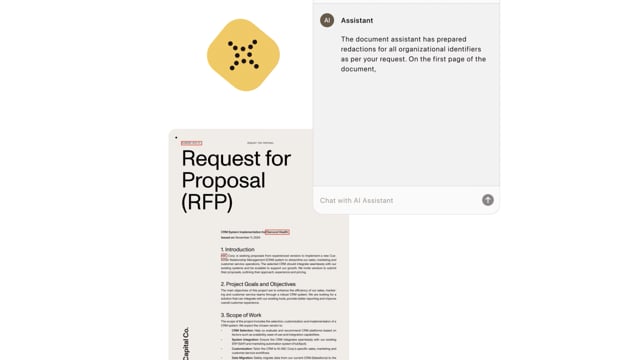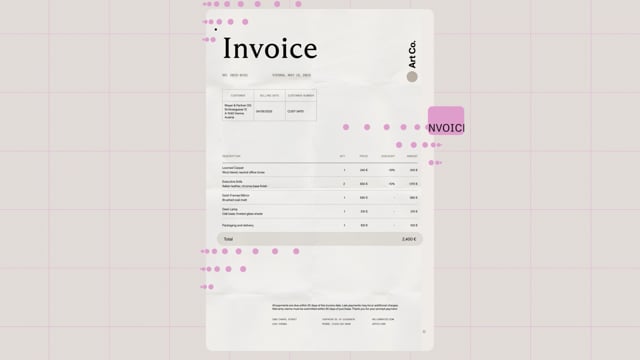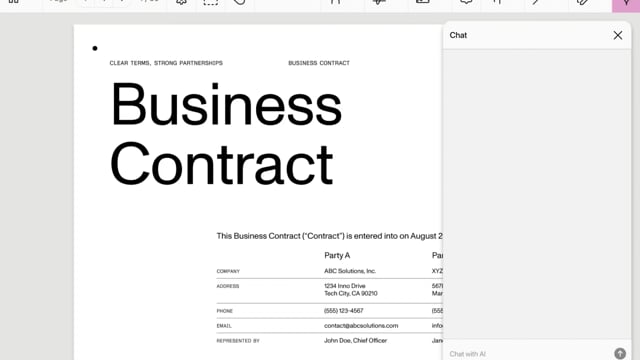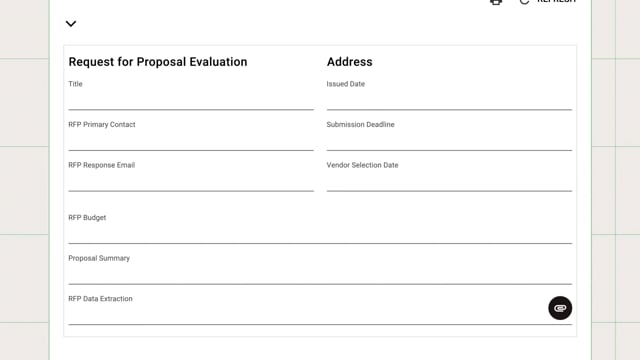DOCUMENT AI
AI is powerful — but only when it’s purposefully applied. Most platforms treat documents as static files. We see them as living assets — rich with context, built for action, and ready to drive smarter decisions and faster workflows.

We embed AI directly into your documents and the tools you already use — enabling redaction, summarization, translation, and automation with just a few clicks.
AI power at every click — from redaction to review to routing. Audit-logged, permission-aware, SOC 2-compliant, and built to scale from day one.
Our models understand structure, metadata, and context — not just content.
Self-hosted or SaaS, OpenAI or local LLM — you choose.
Use our open source MCP Server to connect AI agents with natural language-driven document processing and editing.
Our AI technology is built around three pillars — each designed to move your documents from passive storage to active intelligence. So your workflows move faster, your decisions get smarter, and your team gains leverage.
Build a smarter foundation with structured, contextualized documents before applying AI.

Turn PDFs and scans into clean, reusable code.
Normalize every page for machine-ready structure.
Capture key entities and values automatically.
Bring AI to the tools your team already uses — from browsers to mobile apps to backend systems.

Erase sensitive data in-app or via server API.
Ask to search, summarize, translate, classify, or extract.
Spot meaning-level changes instantly.
Turn isolated actions into automated, governed, end-to-end document workflows.

Drag-and-drop extraction, redaction, and classification.
Audit-logged, permission-aware, SLA-tracked.
Export Markdown, HTML, or JSON.
Want to see Nutrient Document AI in your app today?
COMPARE
One AI core, multiple ways to build. Nutrient adapts to your team’s needs — whether you’re embedding into an app, streamlining M365 workflows, or orchestrating across business systems.
| SDKs | DWS MCP Server | Microsoft 365 | Workflow Automation | |
|---|---|---|---|---|
| Ideal for | Full‑stack developers | Developers building AI agents | IT and power users | Operations and process owners |
| What you can do | Add AI-powered chat, redaction, and data extraction to your app. | Automate document tasks (e.g. redaction, signing) via natural
language commands using MCP-compatible clients. | Redact documents in SharePoint, automate summaries in Power
Automate. | Use AI to extract data from documents and auto-populate form
fields — no code required. |
| You gain | AI‑powered assistant, document processing, and compliance in any
web, desktop, or mobile app. | Seamless integration of document workflows into AI-driven
applications. | AI redaction, generation, and conversion in SharePoint, OneDrive,
and Power Automate. | Scalable, no-code data capture that reduces errors, rework, and
manual effort. |
| | Coming soon |
DEPLOYMENT OPTIONS
AI should adapt to your infrastructure — not the other way around. Nutrient offers flexible deployment options to fit your governance, latency, and scale needs.
Embed document tools directly in the frontend. No backend, instant proof of concept.
Our models understand structure, metadata, and context — not just content.
Fastest path to production with zero DevOps. Nutrient manages your environment with dedicated infrastructure and SLAs.
Quick scale without complexity. Simple setup, no infrastructure required.
Swap in OpenAI, Anthropic, or open source with one line of configuration — or blend them to balance cost, speed, and privacy.
Nutrient prioritizes data privacy and robust security.
Deploy self-hosted LLMs to keep sensitive data entirely within your infrastructure.
When using third-party models, we ensure your data is never used for training.
Nutrient never trains its core models on your documents or AI-generated content.
SOC 2 Type 2 audited, and GDPR- and CSA-compliant — trusted by startups and Global 500 brands.
AI Assistant is a powerful tool integrated into our document SDKs (web and mobile) and low-code and workflow products. It’s designed to revolutionize how you work with documents. Its core capabilities include:
We employ several strategies:
Nutrient offers flexible integration and deployment:
Yes, flexibility is key. Our AI Assistant supports:
Data privacy is a top priority.
Yes. For scanned documents, our system can perform optical character recognition (OCR) to extract text. This extracted text can then be processed by AI Assistant for Q&A and summarization, or to suggest redactions. While directly redacting parts of an image typically uses area redaction tools, identifying text within images via OCR is the first step. We’re also researching more advanced AI models for better layout and image content understanding in the future.
We’re continuously innovating. Key roadmap items include:
AI Assistant is valuable across many sectors where intelligent document processing can drive efficiency and insight:
Pricing for AI Assistant is typically based on factors such as the chosen deployment model (cloud vs. self-hosted LLM), the scale of usage (e.g. number of users, document volume), and whether it’s an add-on to an existing Nutrient SDK license. We work with you to find a model that suits your needs. For a personalized quote and to discuss your specific requirements, contact our Sales team.